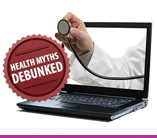Dr. Dotcom: Can You Trust the Health Advice You Read on the Web?

61% of American adults turn to the web for their most intimate health information, but much of the information is incorrect. That's why it's so important to check with your doctor or medical professional before jumping to dangerous conclusions. Lauren Streicher, MD, associate professor of obstetrics and gynecology Northwestern University's Feinberg School of Medicine, sets the record straight about some of the common health myths on the web.
Q: Are larger-breasted women more likely to get cancer?
"No, but they are more likely to miss a lump that could serve as an early warning sign. While breast size has no effect on your cancer risk, a woman with a EEE bra size will have a harder time than an A-cup detecting a 1cm mass. Women of all shapes and sizes should follow screening guidelines for their age and family history."
Q: Does eating yogurt or inserting a dipped tampon help with yeast?
"Absolutely not, that gossip keeps circulating on the Internet. While yogurt can promote the growth of healthy strains of bacteria in the stomach and intestines it will not keep Candida in check and flavored yogurts tend to be high in sugar and can make the infection grow and harder to get rid of. Different parts of the body require different strains of lactobacilli and the proper strains for vaginal health are just not found in yogurt. But, the drug store carries Pro-B, a supplement that contains vaginal strains of probiotic lactobacilli (L. rhamnosus GR-1™ and L. reuteri RC-14™.) If you are itching, see your gyno before self treating to determine whether it's actually a yeast infection or bacterial vaginosis which requires treatment with antibiotics. And, I hate to say, antibiotics may cause a yeast infection because they kill both the good and bad bacteria. Just one more reason to keep yeast and bacteria balanced daily."
Q: I have vaginal odour-Is this because I am not cleaning properly?
"The last thing you want do is use wipes and washes to get rid of the odour or believe that you are not clean. The real issue is vaginal pH. The normal pH of the vagina is between 3.5 and 4.5, creating the best conditions for good bacteria to proliferate. If the pH increases, those good bacteria can't survive, which allows the bad bacteria to take over, leading to that fishy odour and sometimes infections like bacterial vaginosis. Semen and blood have high pH, around 7.4. So if your pH levels are already teetering on the brink, the introduction of semen or blood can tip the delicate pH balance. RepHresh Gel can be found over the counter to help keep levels balanced."
There is so much misinformation on the internet, make sure you are going to a trusted health site and consult with your medical professional. You need a real medical exam to get a proper diagnosis for your personal situation.

Lauren Streicher, MD, associate professor of obstetrics and gynecology Northwestern University's Feinberg School of Medicine
